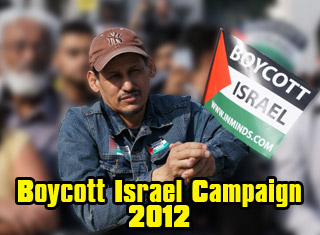
 Innovative Minds © 2014. All Rights Reserved. www.inminds.co.uk | ||||
UK writer urges Brits to join Israel boycottJonny Paul A respected British writer and artist has called for a cultural boycott of Israel.
Today, Palestinians teachers, writers, film-makers and non-governmental organizations have called for a comparable academic and cultural boycott of Israel as offering another path to a just peace. This call has been endorsed internationally by university teachers in many European countries, by film-makers and architects, and by some brave Israeli dissidents. It is now time for others to join the campaign…
Letter from British writers and artists In a letter to the Guardian newspaper on Friday, John Berger calls on writers and artists to undertake a boycott, saying it "could be a factor in Israeli policy changing." The Guardian also dedicated a quarter of a page article in the paper's national news section on Friday to the boycott call, which was signed by 95 others, including musician Brian Eno and writer Arundhati Roy. Berger, a Booker Prize winner, calls for artists to decline being published by mainstream Israeli publishers. The letter accuses Israel of killing children, land grabbing and breaching UN resolutions. The letter says: "There is a fragile cease-fire in Lebanon, albeit daily violated by Israeli over-flights. Meanwhile the day-to-day brutality of the Israeli army in Gaza and the West Bank continues. Ten Palestinians are killed for every Israeli death; more than 200, many of them children, have been killed since the summer. UN resolutions are flouted, human rights violated as Palestinian land is stolen, houses demolished and crops destroyed." It also compares Israel to the apartheid regime in South Africa. It says: "Meanwhile, western governments refer to Israel's legitimate right of self-defense, and continue to supply weaponry. The challenge of apartheid was fought better.The non-violent international response to apartheid was a campaign of boycott, divestment and UN-imposed sanctions which enabled the regime to change without bloodshed." In the letter Archbishop Desmond Tutu and South African minister Ronnie Kasrils are quoted saying the situation of the Palestinians is worse than that of black South Africans under apartheid. The signatories say a boycott offers "another path for peace", and conclude: "Today, Palestinians teachers, writers, film-makers and non-governmental organizations have called for a comparable academic and cultural boycott of Israel as offering another path to a just peace. This call has been endorsed internationally by university teachers in many European countries, by film-makers and architects, and by some brave Israeli dissidents. It is now time for others to join the campaign…"
The situation of the Palestinians is worse than that of black South Africans under apartheid
Archbishop Desmond Tutu & South African minister Ronnie Kasrils The letter follows the call made by British film director Ken Loach in August for a boycott of state sponsored Israeli cultural institutions. "I support the call by Palestinian film-makers, artists and others to boycott state sponsored Israeli cultural institutions and urge others to join their campaign," Loach said. Painting a bleak picture, he added that "Palestinians are driven to call for this boycott after 40 years of the occupation of their land, destruction of their homes and the kidnapping and murder of their civilians. They have no immediate hope that this oppression will end." In August the Edinburgh International Film Festival returned a donation from the Israeli Embassy in London after pro-Palestinian activists inundated the organizers with mail and phone calls and threatened to demonstrate at the event. The Irish Film Festival also cancelled its sponsorship arrangement with the Israeli Embassy in Dublin for the screening of an Israeli film, following the outbreak of the Lebanon conflict. Mark Mulqueen, director of the Irish Film Institute, said in a statement: "The decision is taken in light of the current activities of the Israeli government and prompted by the performance of your ambassador in explaining these acts to the Irish public. It is important for us to separate the screening of an Israeli feature film from activities of the Israeli government." Source: http://www.jpost.com/servlet/Satellite?cid=1164881929869&pagename= JPost%2FJPArticle%2FShowFull Also Of InterestPage URL: http://www.inminds.co.uk/article.php?id=10070
|
|
Support Us
If you agree with our work then please support us.Campaigns INMINDS Facebook Live Feed Latest Video's
INMINDS Twitter Feed Tweets by @InmindsComFeatured Video's
You need Flash player 8+ and JavaScript enabled to view this video.
[all videos (over 200)..] Featured MP3 Podcast  "You cannot simplify the question of violence.. You look at human history - the American revolution, the civil war, the end of slavery in the United States, the African National Congress, the end of colonialism - by and large these were some combination of popular social uprisings and social movements and non-violent protests AND armed resistance. Now that doesn't mean I'm advocating for any armed action today, I'm not. I'm committed to finding ways of acting and speaking and making people laugh and doing art and disrupting the war machine in other ways, but I think focusing on violence when we have the comfort of being protected by mass of armed violence is not non-violence at all.. if you are pointing to the mass of violence and who's doing the mass of violence in the world today, you have to look to state violence - that's people bombing whole cities from the air.. " A founder of the Weather Underground, a revolutionary group that waged war against the US government in the 70s in response to the Vietnam War. Interview, Radio Neatherlands (TSWI) 30 June 2007 [12min / 6Mb] [all podcasts..] Newsletter Feedback |
 |
 |
















































